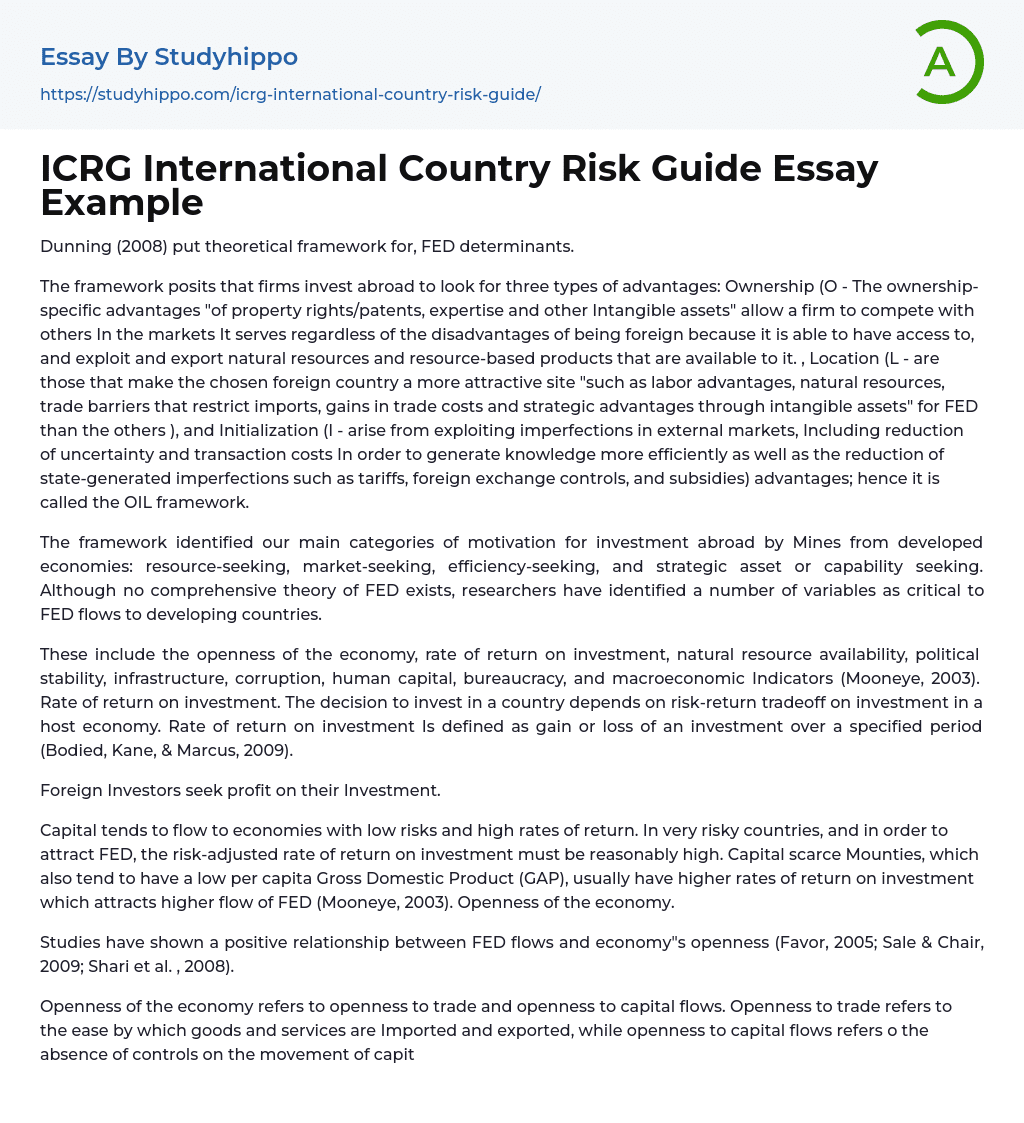According to Dunning (2008), the OIL framework explains the determinants of FEDs and why firms invest abroad for three types of advantages: Ownership-specific advantages (O), Location-specific advantages (L), and Initialization-specific advantages(l). These advantages include various factors such as property rights, patents, expertise, natural resources, trade barriers, gains in trade costs, and strategic intangible assets. The OIL framework also identifies four main categories of motivation for investment abroad from developed economies: resource-seeking, market-seeking, efficiency-seeking and strategic asset or capability seeking. While researchers identify various variables that determine the flow of Foreign Direct Investment (FDI) to developing countries; a comprehensive theory of FDI does not exist due to numerous and varied factors that influence foreign direct investment(FDI) in a host economy. Factors such as openness of an economy, rate of return on investment,natural resou
...rce availability,political stability ,infrastructure ,corruption,human capital,bureaucracy and macroeconomic indicators all affect the decision to invest in an economy outside one's own.Investors seek profit from their investments which is why capital tends to flow towards economies with low risks and high rates of return - finding a balance between risk and potential reward is crucial when investing in foreign markets.Offering reasonably high risk-adjusted rates of return on investment can still attract FDI to countries with high-risk profiles. Capital-scarce countries with low per capita GDP often have higher rates of return on investment, which attracts more FDI flows compared to developed countries where returns may be comparatively lower. Studies reveal that open economies tend to receive greater amounts of FDI due to their ease-of-trade policies and unrestricted movement of capital. Openness refers to both trade policies and lack of control over capital flows. According to Groups
& Mater (2005), exporting helps avoid being exploited by foreign firms interested in taking advantage of local markets. Furthermore, the availability or abundance of natural resources plays an important role in attracting FDI as confirmed by Peepholes & van deer People (2010). Jenkins and Thomas (2002) suggest that investors seeking resources often establish subsidiaries abroad for a more stable or cheaper supply of inputs like raw materials and energy sources. Additionally, economies with natural resource endowments may experience increased FED flows when oil prices rise. Political stability also plays a significant role in attracting foreign investment according to Beak & Asian (2011) and Buses & Heftier (2007).According to Banner (2007) and IL (2006), the political stability of a country is influenced by various factors such as the type of regime, government stability, relationship between political groups, and democratic institutions. Mooneye (2003) notes that democratic countries tend to attract more FED due to their regimes upholding civil liberties, property rights, and rule of law which create favorable conditions for FED flows. However, Daniel & Marin (2006); Hookah & Muezzin (2011) argue that countries lacking political and institutional stability pose high risks that can deter FED flows; three types of political risks are associated with foreign investments - nationalization or expropriation of assets, contract breaches, policy instability; arbitrary regulation related to FED policies can also harm host economies in the long term. Additionally, foreign investors prefer economies with well-developed infrastructure like roads, transportation systems, water supply, electrical power and telecommunication services such as phone,fax and internet since poor infrastructure increases business costs reducing investment profitability(Ongoing 2001).Oinks & Thomas (2002) state that countries lacking proper infrastructure usually incur
higher production expenses compared to those with established infrastructure. Thus, FED is more likely to show a preference for nations possessing superior infrastructure.
- Investing essays
- Asset essays
- Depreciation essays
- Discounted Cash Flow essays
- Foreign Direct Investment essays
- Funds essays
- Internal Rate Of Return essays
- Revenue essays
- Day Trading essays
- Futures Trading essays
- Capital market essays
- Million essays
- Payment essays
- Rate Of Return essays
- Funding essays
- Hedge Fund essays
- American Dream essays
- Barriers To Entry essays
- Capitalism essays
- Central Bank essays
- Compensation essays
- Consumerism essays
- Economic Development essays
- Economic Growth essays
- Economic Inequality essays
- Economic System essays
- Economy essays
- Employment essays
- Export essays
- Finance essays
- Free Trade essays
- Gross Domestic Product essays
- Human Development essays
- Income Inequality essays
- Industry essays
- Inflation essays
- International Business essays
- International Trade essays
- Macroeconomics essays
- Materialism essays
- Max Weber essays
- Microeconomics essays
- Minimum Wage essays
- Monetary Policy essays
- Monopoly essays
- Pricing essays
- Profit essays
- Recession essays
- resources essays
- Taxation essays




